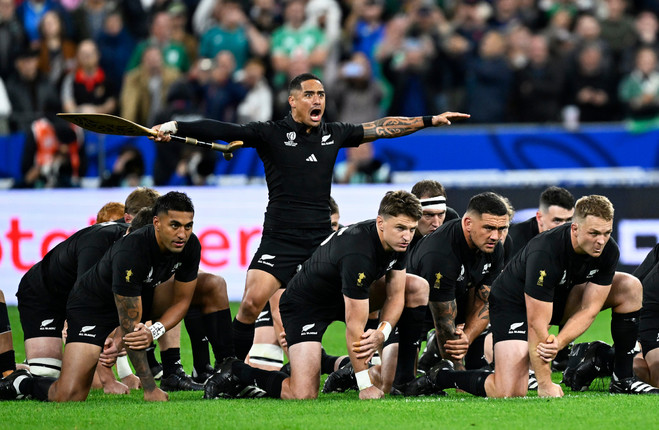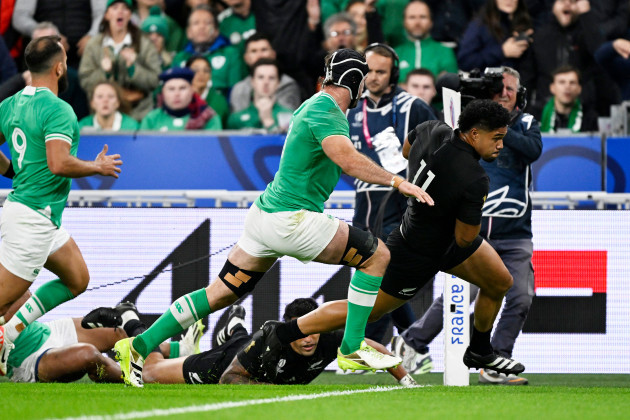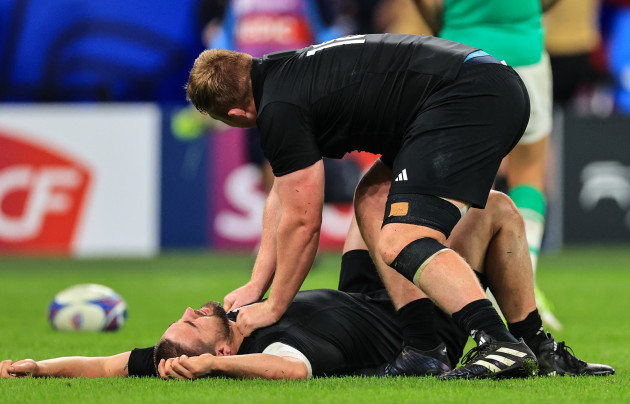IT WAS UNFORTUNATE that a game that may transpire to be the clash of the competition had to come as early as the quarter-final stage.
This showdown between Ireland and New Zealand was always going to come down to small margins and the single score separating the two sides after an enthralling 80 minutes only emphasised that point afterwards.
New Zealand, in the unusual position of underdogs coming into the game, demonstrated a statement of intent with their first visit into Ireland’s 22.
The 29-phase sequence bristled with physicality as the All Blacks initiated attacks close to the ruck, looking to penetrate Ireland’s fringe defence. Ireland’s Simon Easterby-coached defence was not for budging, producing a customary, belligerent set until the 29th phase when Tadgh Beirne was rightly penalised for not supporting his body-weight in the jackal position.
A buoyant New Zealand rushed into a 13-0 lead and the variety of their kicking game was central to that.
Ireland often defend without a defender behind the frontline. This provides additional width to your ‘D’, but it also leaves your chip-line exposed and New Zealand’s first try illustrated their calculated intent to exploit that space.
From a trademark, booming left-footed clearance kick by James Lowe, Beauden Barrett immediately took space early and rather than returning fire with a territorial kick, he identified the space in Ireland’s chip line. The flying fullback executed a perfectly weighted kick and regathered, shipping an enormous hit from Lowe in the process.
From the next phase, New Zealand, at their best in unstructured rugby, moved the ball to space with accurate passing and square running lines. They brilliantly finished off with a lovely one-two between Reiko Ioane and Leicester Fainga’anuku to score in the left corner.
Shortly afterwards, Richie Mo’unga found Ardie Savea — not for the first time in the competition — with another deft chip in phase play to give New Zealand momentum in attack.
A huge Ireland turnover at the breakdown stopped All Blacks proceedings on this occasion, but it was clear Ian Foster’s side had identified a means of unlocking Ireland’s oppressive defensive system.
It was a different type of kick that indirectly led to New Zealand’s second try of the night. This time Will Jordan, who was a pivotal figure for New Zealand all night in attack, brilliantly identified real estate in Ireland’s backfield and executed a 50-22 to give his team an attacking lineout deep in the Irish 22.
The All Blacks cleverly set up a dummy drive from the ensuing lineout before Aaron Smith released a bullet pass to Jordie Barrett who managed to tie up both Irish centres in the initial carry.
The brilliant Sam Cane was held up just short on second phase, but New Zealand were not to be denied with Jordan swinging back the short side on penalty advantage to find Ioane who again came up with the assist, this time for Savea to finish brilliantly in the right corner.
There will be deep regret within Ireland camp at the ease with which they conceded the third try of the game, Richie Mo’unga’s speed and Jordan’s clever inside trial line causing a breakdown in Ireland’s structured lineout defence.
Finlay Bealham, having just come onto the field to replace Tadhg Furlong, appeared to miss the jump and lose connection with Josh van der Flier at the seam which Mo’unga ruthlessly exploited before finding his Crusaders teammate to score the game-defining try.
On the other side of the ball, one of the intriguing battles was always going to be at the breakdown and, particularly, how New Zealand would look to stem Ireland’s attacking flow.
They did not disappoint, with both Savea and Sam Cane coming up with a couple of big jackal turnovers early in the game as Ireland struggled to build phases and get into their multi-phase attack.
Intriguingly, though, as the first half developed, it became apparent that by applying pressure at the breakdown, New Zealand were significantly shortening their defensive line. This meant that Ireland had time and space to attack both edges of the field.
They happily took advantage of this reality and it wasn’t long before Johnny Sexton started to pull the strings and Ireland’s multilayered attack began to fire as they clawed back the early deficit.
Staggeringly, Sexton would finish the game with 73 passes which is an extraordinary total (his opposite number Mo’unga, by contrast, had 19). It pointed toward the lack of defensive line-speed the All Blacks were able to apply.
Still, they persisted with throwing numbers into the defensive ruck and both Brodie Retallick and Savea came up with big turnovers when it looked like Ireland were on the cusp of adding to the scoreboard.
Then, when Ireland’s maul delivered the penalty try and a sin-binning to Codie Taylor in the 64th minute, it looked like the game had swung in their favour.
However, the epic 37-phase end-game brilliantly encapsulated the story of the match.
This was an incredibly brave defensive stand by the Kiwis. They conceded ground but their connection and scramble in defence was heroic and despite wave after wave of attack — with some incredible surges by Bundee Aki and Ringrose — neither Sexton nor those around him could find the pivotal final pass to breach the All Blacks’ defence.
It was substitute Sam Whitelock who came up with the game-winning turnover at the breakdown, New Zealand’s eighth of the game.
With it came a memorable victory and a place in the last four of the competition.
Ireland’s wait goes on.



